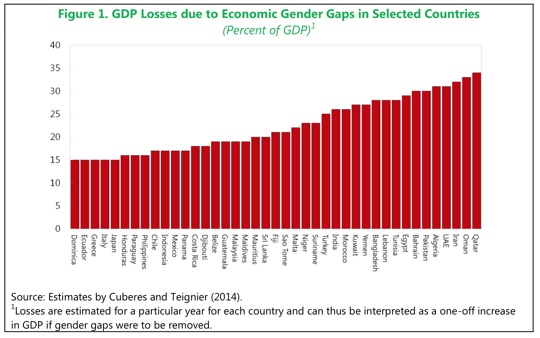Behold the IMF: an organization that has become a champion of women’s economic empowerment in a big way.
The International Monetary Fund, that citadel of macroeconomic orthodoxy, has stated loudly and clearly that countries’ long-term prosperity depends on making more room in the labor force for women. In a speech last September in Japan, IMF Chief Christine Lagarde made the point elegantly: “We will need all the economic growth, dynamism, and ingenuity we can get in the years ahead. Thankfully, a key part of the solution is staring us right in the face—unleashing the economic power of women. Bringing the world’s largest excluded group into the fold.”
Looking across countries, the IMF has estimated that expanding economic opportunities for women can increase national income by 15 to 30 percent. And the institution, known in the past for harsh macroeconomic prescriptions, now offers up recommendations focused on economic inclusion.
GDP Losses to to Gender Gap in Select Countries, from Fair Play: More Equal Laws Boost Female Labor Force Participation (Image Credit: IMF)
In a study released just this past Monday, IMF researchers found that women’s participation in the job market depends on national policies that give women an equal chance at inheriting property, owning land, opening bank accounts and pursuing an occupation of their choosing. Many countries have gender-biased policies on the books and women’s full economic productivity simply can’t happen under the current rules of the game.
Their conclusion is straightforward: Want to grow your economy? Fix the gender-based discrimination that’s codified in laws and regulations. As Lagarde wrote about the study on her blog, “By helping women reach their full economic potential, we can also help boost growth, prosperity and stability for the whole world. In a world in search of growth, women will help find it, if they face a level playing field instead of an insidious conspiracy!”
This is precisely what the world needs to hear from the IMF—but we need to hear more.
We need to hear that the IMF sees and understands the informal economy, which is where the majority of female workers in many countries can be found. Yes, it’s great to pass laws that permit women to inherit property and pursue careers in occupations like teaching, banking, and hospitality. It would be even better to provide legal protections for domestic workers, women who sew garments in their homes, food vendors at construction sites, and people who sort out recyclable and reusable items from vast mountains of waste. Those workers are contributing to the economy, too.
We need to hear that the IMF recognizes the unpaid labor that keeps households running, farms producing, and family businesses afloat. National income measures don’t include the value of childcare, eldercare, cooking, cleaning, and many other services when they are provided outside of the context of a market transaction. As a consequence, productivity is vastly underestimated—and the contribution that women make is too often invisible to economic policymakers. Wages for housework? Maybe not. But recognition of the economic value of care and other unpaid work? A fitting task for a global financial institution.
And we need to hear that when IMF staff members work with Ministries of Finance to analyze economic policy options, they pay attention to gender-specific impacts. Everything from tax regimes to caps on the public sector wage bill to infrastructure investments have different implications for women than for men. For example, because men and women have different purchasing patterns, sales taxes have gender-specific effects. And because teachers are both typically the single largest block of government workers and (in some countries, at least) disproportionately female, efforts to limit government spending can end up hitting women workers harder.
The fact that women may be negatively affected doesn’t necessarily mean that a particular policy option should be rejected; the benefits over the long run may outweigh short-term pain. But if the IMF’s leadership is serious about seeing women as an important part of the economic growth equation, the institution needs to recognize and think through the gender-specific effects of policy prescriptions.
There’s a big agenda ahead for those at the IMF who are looking for ways to combat the “insidious conspiracy:” recognize the informal sector, count unpaid labor, assess gender-specific policy impacts. It’s a big agenda that will pay off in a big way for women, families, and the global economy.



